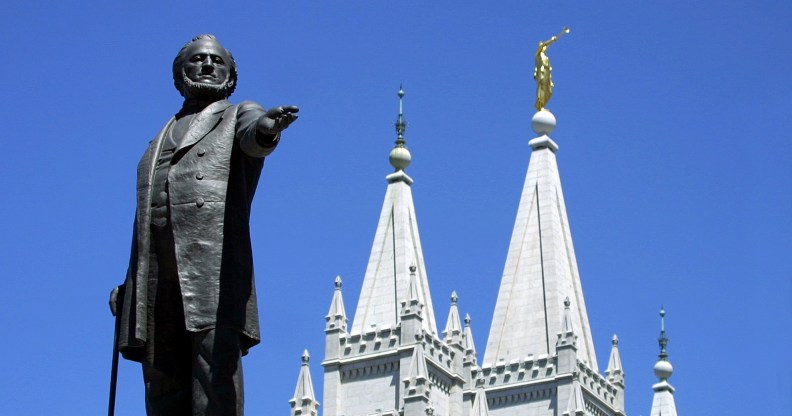Mormons fight for ‘right to discriminate’ against transgender children

The Mormon Church has filed a brief with the Supreme Court opposing protections for transgender kids – because it doesn’t want its discriminatory practices to be seen as discriminatory.
The Supreme Court is soon expected to begin hearing the case of Virginia transgender teen Gavin Grimm, whose school ordered him to use a toilet that correspond with his “biological gender”.
Grimm sued the Gloucester County School Board with help from the American Civil Liberties Union, arguing that the policy infringed against the rights of trans people.
His case, which has now found its way before the US Supreme Court, is expected to set precedent on whether civil rights law Title IX, which outlaws discrimination in education based on sex, also covers gender identity.
The ruling could be far-reaching given the lack of federal anti-discrimination laws protecting LGBT people.
Ahead of the hearing, six faith groups including the anti-LGBT Mormon Church have filed a brief urging the court to rule against trans rights.
One section of the brief astoundingly argues that if LGBT people are protected from discrimination, religious groups who discriminate against LGBT people might be seen to be discriminating.
It contends: “Accepting the Department’s reading of Title IX would take a long step toward delegitimizing traditional religions.
“Making gender identity a protected class under Title IX implies that traditional attitudes toward gender identity are discriminatory.
“That implication, enshrined in federal civil rights law, would impose a stigma on religious people and institutions whose faith dictates that gender identity is determined by one’s birth sex.
“Religious denominations and their members could come under attack for selecting leaders who reflect their religious beliefs about gender. And religious Americans could find themselves increasingly marginalized for believing that gender is immutable and divinely ordained.”
It adds: “Religious beliefs and commitments held by… major faiths contradict the Department’s premise that gender identity is not determined by one’s birth sex. Denying the intrinsic connection between physiology and gender runs counter to the religious conviction that gender is God-given and immutable.
“Even if limited to Title IX, the Department’s interpretation would provoke serious religious conflicts. Schoolchildren would be taught that gender is not determined by one’s birth sex, contrary to their parents’ faith.
“Religious colleges and universities would find it difficult to maintain sex-specific dormitories and other residences. The modesty and privacy of sex-specific facilities, such as showers and changing rooms, could be compromised.”
It says: “Gender as a divinely ordained characteristic is central to the doctrine and beliefs of The Church of Jesus Christ of Latter-day Saints. The Bible records that God created human beings in His image — ‘male and female created he them’.
“Latter-day Saints believe that birth as a male or female carries spiritual meaning. Men and women are not interchangeable. A person’s gender is to be embraced, along with the complementary but distinct paths that God ordains for men and women.
“While gender is an essential and eternal attribute of personal identity, the Church acknowledges the reality of gender dysphoria and related conditions.
“They impose heavy burdens, and those who bear them deserve compassion and respect. The Church welcomes efforts by responsible officials to seek mutually respectful solutions that reasonably accommodate transgender concerns while fully preserving religious liberty.”
The brief was signed by the Church of Jesus Christ of Latter-day Saints, the United States Conference of Catholic Bishops, the Union of Orthodox Jewish Congregations of America, the National Association of Evangelicals, the Ethics and Religious Liberty Commission of the Southern Baptist Convention, The Lutheran Church–Missouri Synod and the Christian Legal Society.
Donald Trump has vowed to relax laws that prevent tax-exempt religious groups from directly intervening in politics.

